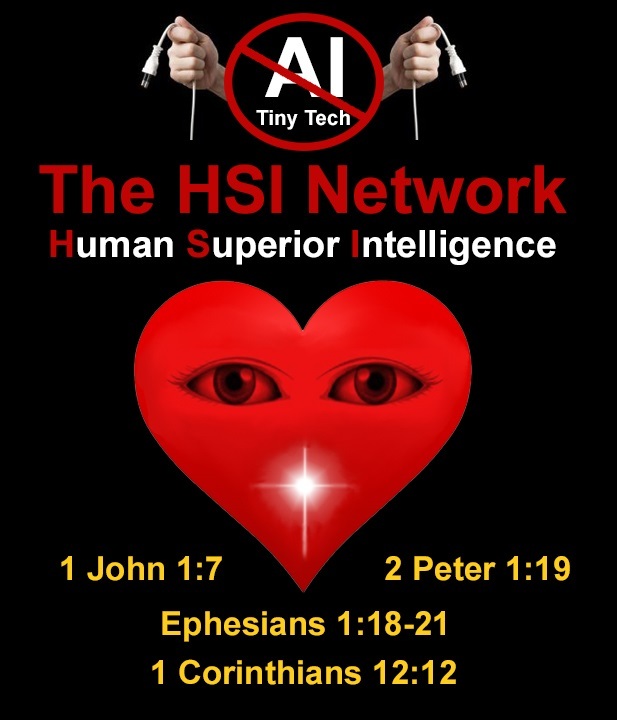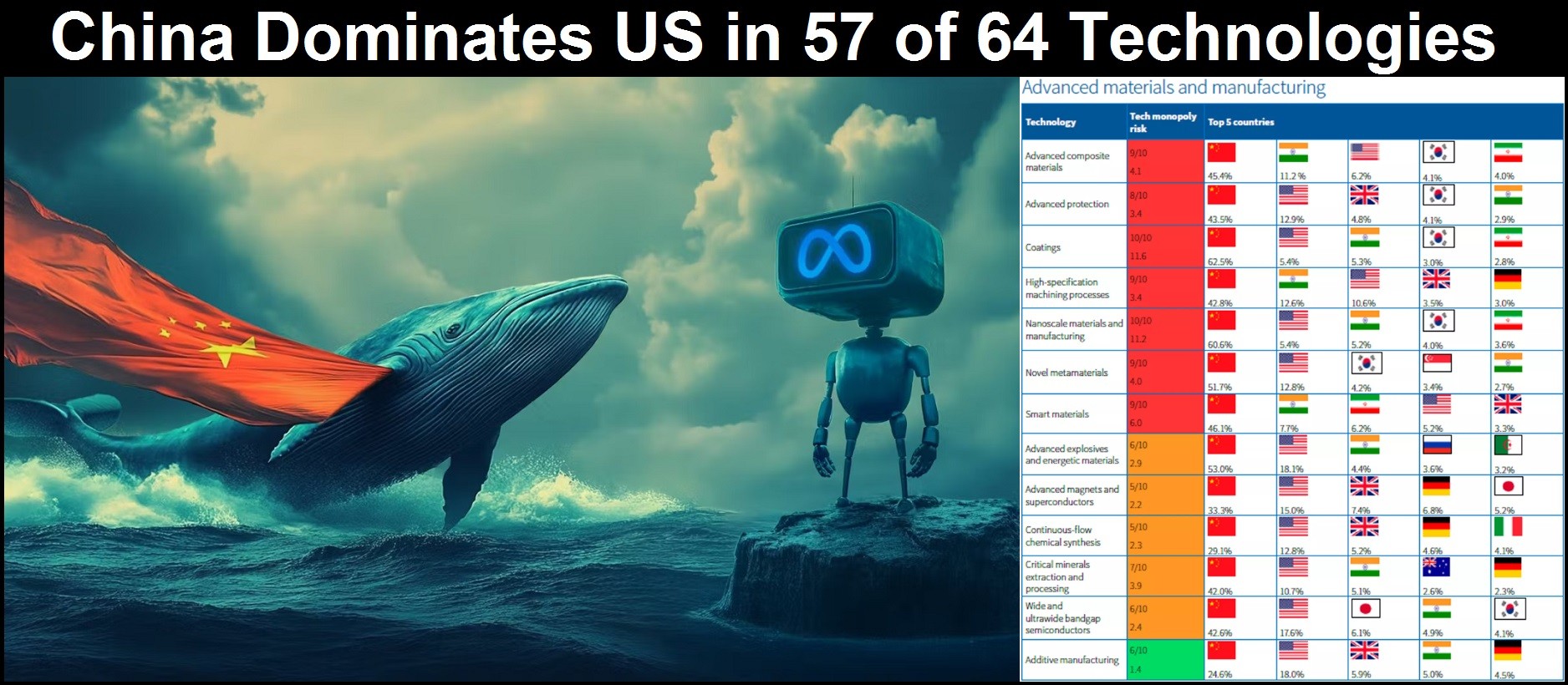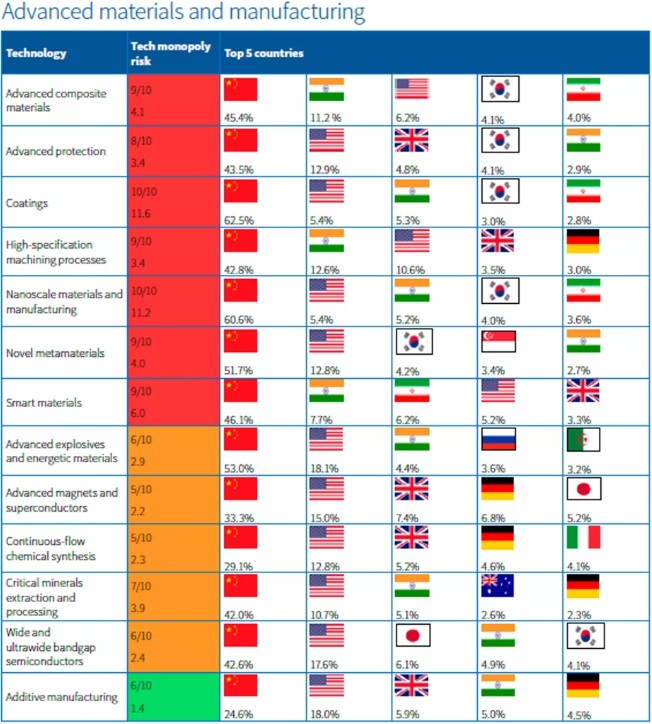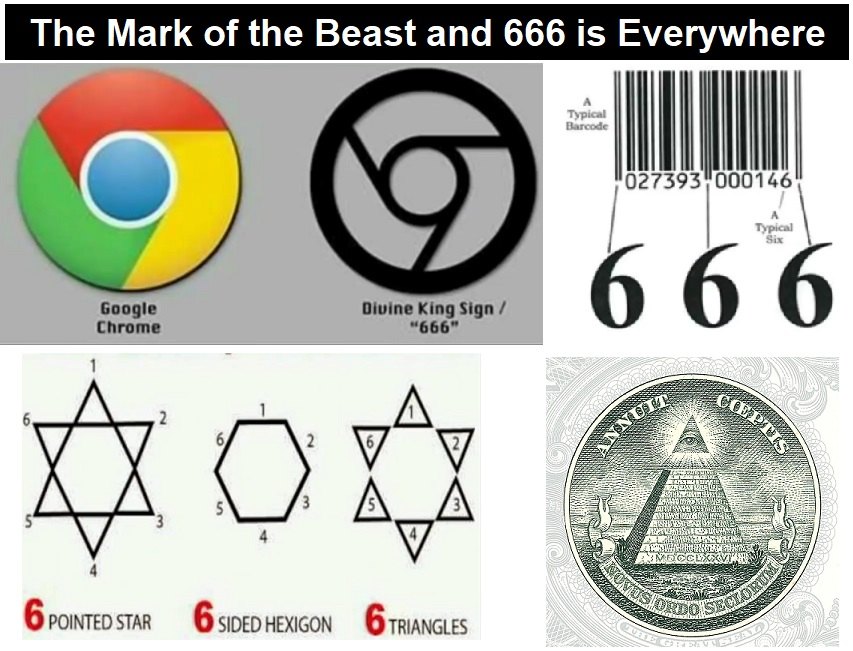by Brian Shilhavy
Editor, Health Impact News
Shock waves rolled through American Big Tech companies last Sunday, as it was reported that the Chinese AI program, DeepSeek, was performing better than any U.S. AI program, for a fraction of the cost.
Meta (Facebook) was one of the first American Big Tech companies to sound the alarm last Sunday night, as reported by The Information:
Meta Scrambles After Chinese AI Equals Its Own, Upending Silicon Valley
Artificial intelligence researchers at Meta Platforms have been in panic mode.
In recent days, leaders of some of the company’s AI teams openly worried that new conversational AI made by a Chinese hedge fund meant Meta was falling behind in the AI race.
Leaders including AI infrastructure director Mathew Oldham have told numerous colleagues they are concerned that the next version of Meta’s flagship AI, Llama, won’t perform as well as the Chinese AI, DeepSeek, according to two Meta employees with direct knowledge of efforts to catch up.
The Chinese fund shocked the AI industry in late December by releasing a version of DeepSeek that matched or outperformed models from Meta, OpenAI and Anthropic in completing various tasks, according to multiple interviews with six researchers at the U.S. AI companies, evaluations published by research firms, as well as anecdotal examples from customers of the DeepSeek models.
This month, Hangzhou-based High-Flyer Capital Management upped the ante by releasing another version of DeepSeek that may be on par with OpenAI’s o1 reasoning model, raising questions about whether some American AI firms have been operating inefficiently or spending too much capital for inferior results.
App developers can freely download DeepSeek or buy access to it through a cloud-based application programming interface. Some smaller app developers say they have switched to using DeepSeek because it’s so much less expensive than using OpenAI or Anthropic models.
Consumers can use DeepSeek through a chatbot mobile app that competes with OpenAI’s ChatGPT. On Sunday, the DeepSeek app had risen to second place, just behind ChatGPT, in the Apple App Store’s list of top free apps. (Full article – subscription needed.)
When the U.S. stock market opened the next morning on Monday this week, American Big Tech companies had lost over $1 TRILLION in value.
They gained back much of that this week, until today, Friday, Jan. 31st, when the market turned sharply down in afternoon trading over fears of Trump’s tariffs that are supposed to be announced tomorrow, Saturday Feb. 1st. (I will report on that story after I see what the actual tariffs will be.)
However, in an article published in the Russian media this week, it was reported that the U.S. has lost its edge over China in more than just AI models, and that the U.S. is now behind China in 57 of 64 critical technologies.
China Has Edge Over US on Much More Than AI Models
The shock release of a new Chinese AI known as DeepSeek that’s cheaper, faster and open source sent shockwaves across Silicon Valley, wiping $1 trln off tech stocks and prompting pundits to dub the development a “Sputnik moment” for the US.
But AI language models aren’t the only area where China is now comfortably in the lead.
A comprehensive, 20-year study released by the Australian Strategic Policy Institute in 2024 calculated that China dominates the US in 57 of 64 critical technologies, up from just three in 2007.
The US, which led in a whopping 60 sectors in 2007, now leads in just seven.
ASPI based its rankings on cumulative innovative and high-impact research published and patented by national universities, labs, companies and state agencies.
Where Does China Excel?
- advanced integrated circuit design and fabrication
- high-specification machining processes
- advanced aircraft engines
- drones, swarming and collaborative robots
- electric batteries
- photovoltaics
- advanced radiofrequency communication
See also:
New Blow to US Sanctions: Russia and China Boost NVIDIA Performance 800-Fold
Scientists from the two countries have developed a breakthrough algorithm using information from reverse engineering video card accelerators. The algorithm allows gaming GPUs to be used for scientific computing.
The innovation was achieved by specialists from Shenzhen MSU-BIT University, co-founded by Lomonosov Moscow State University and Beijing Institute of Technology.
This enables Russia and China to reduce their reliance on NVIDIA GPUs, weakening the impact of US sanctions.
It also means that Russia and China need to buy less NVIDIA GPUs, which likely led to the collapse of NVIDIA stock price, Russoft association President Valentin Makarov tells Sputnik. (Source.)
TikTok Battle: China Won

The day before Trump’s inauguration, on January 19th, a bipartisan law passed in Congress requiring TikTok to either sell the entire company to the U.S., or be banned, went into effect.
TikTok’s parent company, ByteDance, had appealed this law all the way up to the U.S. Supreme Court, which ruled 9-0 that the law had to be upheld, just days before the law was to take effect.
The Biden Administration made it clear that they would not enforce the ban, stating that it would be futile to do so just one day before Trump took office, and that this was Trump’s problem.
This was not good enough for ByteDance, however, as it wanted assurances that the U.S. Government would not enforce the ban.
This then provided the first showdown between China and the U.S. under the new Trump 2.0 presidency.
In the end, the U.S. and Trump backed down, assuring ByteDance that Trump would issue an executive order the next day on Trump’s first day in office, but only AFTER ByteDance began the process of shutting down the app first.
Trump issued the EO the next day, over-riding U.S. law like most of his EOs, and even defying the U.S. Supreme Court decision.
It was spun in the U.S. media and by Trump’s team as a “victory” for Trump, as the popular app came back online, making hundreds of millions of people in the U.S. very happy that the app was still available to them.
But this was NOT a victory for Trump. It was a victory for China.
Contrary to most everything you may have read in the U.S. media, at least outside of tech publications, the issue was NOT finding a U.S. buyer for TikTok. Oh no, there are a whole list of $billionaires and U.S. companies that would have LOVED to purchase China’s stake in ByteDance.
It was China who said no, and did not allow ByteDance to sell the Chinese-owned shares in ByteDance to American businesses.
Martin Peers, writing for The Information, reported this just two days before the ban was scheduled to take place:
While it’s too early to predict what’s going to happen with TikTok, it’s beginning to look like ByteDance has successfully called the U.S.’s bluff.
For months, ByteDance has refused to contemplate selling TikTok to avoid a ban. And now, days before the ban is due to take effect, politicians are caving in.
Most notably, Senate Democratic leader Chuck Schumer posted on Bluesky on Thursday that “more time is needed to find an American buyer for TikTok. We will continue working to keep TikTok alive.”
Yeah, right—that was the problem all along: ByteDance didn’t have enough time to find a buyer, despite passage of the ban law way back in last April.
Meanwhile, incoming President Donald Trump’s national security adviser to be, Mike Waltz, told Fox News on Thursday that “we will put measures in place to keep TikTok from going dark.”
In another Fox News interview, he said Trump would “create the space to put” a deal in place for TikTok.
Put aside for a moment the complications inherent in delaying the ban-or-sell law (presidential executive orders are frequently challenged in court, and not enforcing the law could have other issues, as Supreme Court Justice Brett Kavanaugh noted last Friday).
The problem with the sale isn’t a lack of buyers, as would-be buyer Bobby Kotick could attest.
There’s simply no sign ByteDance wants to sell, and there’s every reason to think China won’t let ByteDance sell TikTok, along with the algorithm that helps the app operate.
Forcing the issue with the ban might have changed minds at ByteDance.
Elizabeth Prelogar, the U.S. solicitor general, told the Supreme Court last week that the ban “might be just the jolt Congress expected the company would need to actually move forward” with a sale.
But by backing away from imposing the ban now, the U.S. will likely lose that leverage.
The question now is whether Trump can change the dynamic by throwing China a bone to get it to agree to TikTok’s sale. You have to wonder, though, how far he would be willing to go to keep TikTok alive. (Source.)
Shutting down TikTok would have lost $BILLIONS for the U.S. economy, NOT the economy of China, as China’s primary investment in TikTok is the value of the stock they own.
But TikTok generates between $15 – $16 billion in revenue in the U.S., and thousands of people, “content creators”, have become millionaires just from content published on TikTok that goes directly into the U.S. economy.
One company that would have probably gone bankrupt if TikTok had remained offline in the U.S., is Larry Ellison’s Oracle, which hosts TikTok’s servers.
Oracle warns that a TikTok ban would hurt business
A U.S. ban of TikTok might hurt Oracle’s business, the software company acknowledged in its annual report on Monday.
Oracle provides cloud infrastructure for TikTok, which has over 150 million users in the U.S.
“If we are unable to provide those services to TikTok, and if we cannot redeploy that capacity in a timely manner, our revenues and profits would be adversely impacted,”
Oracle said in its annual report for the fiscal year ended May 31. (Source.)
So ByteDance called the U.S.’s bluff, and began shutting down the app the day before Trump’s inauguration.
I can almost guarantee that Larry Ellison got on the phone with Trump when that happened, and it did not take long before Trump committed to a 75-day delay in enforcing the ban that is now U.S. Law and declared Constitutional by the U.S. Supreme Court in a 9-0 decision.
And Trump has now changed his tune regarding TikTok, and stated that he is negotiating a deal for a U.S. business (perhaps Oracle) to buy a 50% stake in the company, and everyone is hailing Trump as some kind of hero, while U.S. investments into ByteDance and TikTok have probably already been above 50% for quite some time now via hedge fund managers on Wall Street.
And of course, as I have previously reported, Larry Ellison is now jumping into the mRNA “vaccine” manufacturing to produce new “cancer vaccines” in Operation Warp Speed 2.0. See:
Trump Rolls Out Operation Warp Speed 2.0 During First Days in Office with Project Stargate
So under Trump’s few days in office, Larry Ellison has gone from almost losing his company Oracle from a ban of TikTok, to a major player in Big Tech for Trump.

And as the U.S. has spent $billions in military weapons sent to Ukraine and to Israel the past few years, China has largely stayed clear of any armed conflicts, choosing instead to focus on building its military and technology to protect its own mainland, prompting a U.S. military report published last summer to conclude that the U.S. had no chance of defeating China in an armed conflict.
U.S. Military Report: U.S. Cannot Defeat China, U.S. Public Unaware of Dangers and Unprepared for Societal Breakdown
A truly historic event was held in Washington D.C. this week that barely broke into the news cycle, when Eric Edelman and Jane Harman, from the Commission on the National Defense Strategy, presented their findings to members of Congress based on a RAND Corporation published report that came out this week explaining that the U.S. could not win a war against China, and that Americans are totally unaware of the danger they are in and totally unprepared for the consequences of such a war, such as a Cyber Attack that would bring down our ports and much of our network services infrastructure.
It’s one thing to read an article in the Alternative Media warning about the imminent collapse of society we are facing due to current world events, but it ceases to be a “conspiracy theory” when the exact same thing is said by a DoD military think tank before members of Congress.
I am posting the entire 2-hour video of this Congressional report, as well as a link to the actual study published by the RAND Corporation, but here are a couple of clips that together are under 5 minutes long that show how serious of an issue this is that most Americans are totally oblivious to, and that was barely even mentioned in the news this week. (Full article.)
China has already surpassed Tesla in producing a better and less expensive electric vehicle that now outsells Teslas in China, and they have already surpassed Apple in producing a better and less expensive smartphone than Apple, which has decreased sales for both Tech companies in China and around the world, as was reflected in their annual reports earlier this week.
But all these technology companies had to do was sell more hopium about the future of AI to investors this week to keep their stock prices up, as Elon Musk, who has been promising fully autonomous self-driving vehicles for about a decade and a half now, has now promised to have them on the streets by June this year (2025).
And investors on Wall Street continue to keep believing him and all the other Big Tech American CEOs, as their stock values rose this week in spite of slumping sales, at least until today when Trump’s threats of tariffs cooled down the market some.
The only thing that has continued to bring huge earnings to Big Tech companies since the elections last November, has been the hopium drug everyone is on since Trump promised them the moon if he won the elections.
But this hopium drug high won’t last much longer, as this is perhaps the largest stock bubble of our time, maybe since the Great Depression.
Reality will eventually correct the markets, if not destroy them.
Behold your new King America! This is the man you wanted, and now you have him.
No king is saved by the size of his army; no warrior escapes by his great strength. A horse is a vain hope for deliverance; despite all its great strength it cannot save.
But the eyes of the LORD are on those who fear him, on those whose hope is in his unfailing love, to deliver them from death and keep them alive in famine.
We wait in hope for the LORD; he is our help and our shield. In him our hearts rejoice, for we trust in his holy name.
May your unfailing love rest upon us, O LORD, even as we put our hope in you. (Psalms 33:16-22)
Comment on this article at HealthImpactNews.com.
This article was written by Human Superior Intelligence (HSI)
See Also:
Understand the Times We are Currently Living Through
New FREE eBook! Restoring the Foundation of New Testament Faith in Jesus Christ – by Brian Shilhavy
Who are God’s “Chosen People”?
KABBALAH: The Anti-Christ Religion of Satan that Controls the World Today
Christian Teaching on Sex and Marriage vs. The Actual Biblical Teaching
Exposing the Christian Zionism Cult
The Bewitching of America with the Evil Eye and the Mark of the Beast
Jesus Christ’s Opposition to the Jewish State: Lessons for Today
Identifying the Luciferian Globalists Implementing the New World Order – Who are the “Jews”?
The Brain Myth: Your Intellect and Thoughts Originate in Your Heart, Not Your Brain
What is the Condition of Your Heart? The Superiority of the Human Heart over the Human Brain
The Seal and Mark of God is Far More Important than the “Mark of the Beast” – Are You Prepared for What’s Coming?
The Satanic Roots to Modern Medicine – The Image of the Beast?
Medicine: Idolatry in the Twenty First Century – 10-Year-Old Article More Relevant Today than the Day it was Written
Having problems receiving our emails? See:
How to Beat Internet Censorship and Create Your Own Newsfeed
We Are Now on Telegram. Video channels at Bitchute, and Odysee.
If our website is seized and shut down, find us on Telegram, as well as Bitchute and Odysee for further instructions about where to find us.
If you use the TOR Onion browser, here are the links and corresponding URLs to use in the TOR browser to find us on the Dark Web: Health Impact News, Vaccine Impact, Medical Kidnap, Created4Health, CoconutOil.com.






















